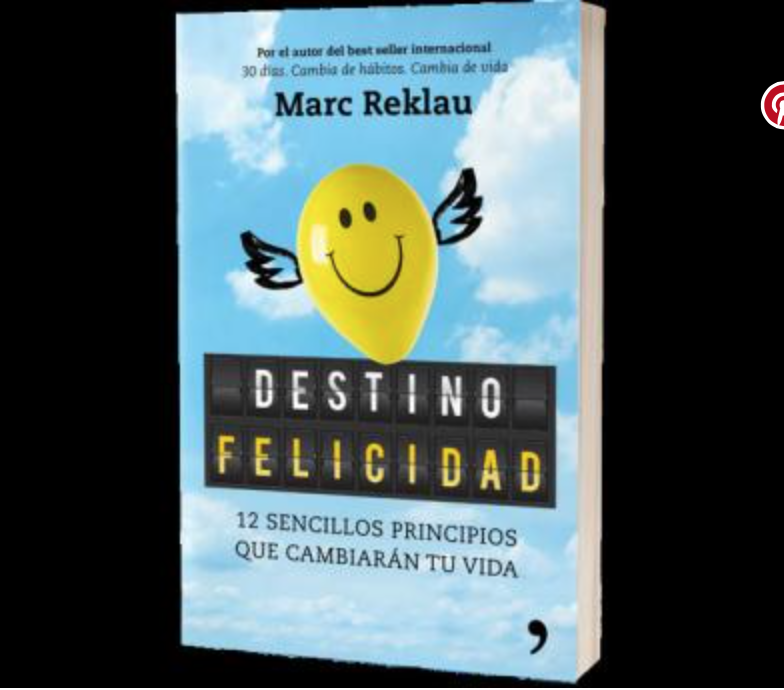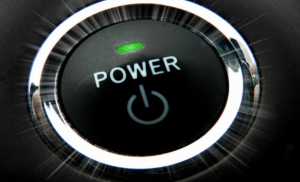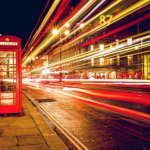Marc Reklau: “Our biggest enemy is our mind.”
In the pursuit of Happiness
This article by Ana Palicio was initially published in the Spanish journal for parents “Ser Padres.” Ana got exactly what I wanted to communicate. One of the best articles about my book “Destino Felicidad” (Destination Happiness) so far.
Who doesn’t want to be happier? This search for happiness is a constant for the human being. The author of the book “Destination Happiness” gives us some keys to achieve it.
The more optimistic and happy we are, the more success we achieve. That’s the key that emerges from the book Destination Happiness (Ediciones Temas de Hoy) by author Marc Reklau. A life teaching that shows us that happiness is not a destination: it is a path, a process that we initiate at the moment that we are willing to make small changes in our life. Small changes that will end up becoming a change of life.
If someone tries to find the magic formula to achieve happiness in this book, he or she must know that it does not exist. Behind success, according to Reklau, there is no magic, what there is is hard work and effort. Also, the idea of always being happy, at all times, is another mistake: the ups and downs are part of life, and you just cannot be happy at all times.
Marc Reklau is an expert in personal development, speaker, and author of the International Bestseller 30 Days – change your habits, change your life, which since April 2015 has been sold and downloaded more than 170,000 times. Reklau was fired from his job, and it was at that moment when his great life change began, and it didn’t go all that bad for him. From unemployment to Bestseller. Now, with Destination Happiness, he tries to help people to get the life they want through their own experience and his advice. We chatted with Reklau about the keys to be happier
Is happiness a state or is it something momentary?
Happiness is something different for everyone. It is not something that happens to you. According to science, it is a choice, but it requires effort. It’s small daily habits like being grateful, being optimistic, meditating, exercising, smiling and you can learn them. You can be happy in the present moment, better said: it is the only moment where we will find happiness. The new job, the promotion, the new car and even winning the lottery will only give you a temporary high, and then you return to the base level of happiness. We will be as happy or as unhappy as before. Of course, we can work intentionally on the base level of happiness for each one of us through the habits that I have just named. Even so, we won’t be happy all the time. It would not be normal. The ups and downs are part of life.
Why should we strive to be happy, in addition to the personal benefit of course?
The truth is that everyone is as happy as they want to be. I know, it sounds horrible, especially if you’re in a tough situation – but it’s what it is. Victor Frankl was a Jewish psychologist who was imprisoned in German concentration camps in World War II and lost his entire family, except for his sister and defended what he called “the ultimate human freedom”: deciding how the external circumstances will affect you. According to this author, we are the ones who DECIDE how the things that happen to us will affect us. I would dare to say that if a person imprisoned in a Nazi concentration camp could carry out this idea, we all can.
We can make an effort to be happier, but we should not try so hard always to be happy.
Being happy always would not be normal. Painful emotions such as sadness, envy, anger, failures, low blows are also part of life, and it is useless to ignore them: you have to accept them, learn to deal with them and learn to overcome obstacles. Asking ourselves “How can I make this situation better?” Or “How can I get the best out of this situation?” is a great help.
What prevents us from clicking to change things?
In theory, nothing, but that change in on click happens very, very rarely. It is better to accept that change, in most cases, is a process, and sometimes quite long. We always hope that something happens that changes our lives and that happens very rarely. My change has begun when I have started doing small things differently in my daily life. These small daily changes, in the end, have caused a significant change: in my case, I have gone from being unemployed to becoming an international bestselling author, speaker, and consultant. This has not happened in two days, it has been the result of a couple of years of very hard work, a year of trial and error, a year of painful failures.
Another problem is that change is associated with the unknown and our brains have been programmed for thousands of years for fear or distrust of the unknown. Many times we associate change with pain, and we do not want to feel pain. Another reason is that we believe it is very difficult or impossible to change. Until 20 years ago it was thought that the brain can not be changed, but afterwards, it has been shown that our brains change and that we too can change, we can learn new things even when we are older.
Who should read this book?
This book is for people who want to be happier, but do not know how to do it. It is for people who think that happiness is a destination (it is not). It is a process, a path. And if you ask yourself, why is the book called Destination Happiness then? That’s because I want to reach the vast majority of people who think that happiness is a destination, and look for solutions. People who are tired of being dependent on other people or who are waiting for external circumstances to become happier. They have heard about “happiness is a choice,” but they do not believe it. They are a bit skeptical and do not believe in self-help. They need proof. People who believe that happiness is something that we can not control and that comes from outside will be surprised when they read the book. My book 30 Days – Change your habits, change your life is based on personal experiences that one can believe or not, but in Destination Happiness, I show the scientific evidence that all this is possible and how it can be achieved. I think that each person has the intrinsic right to be happy and I want to give them a guide on how little by little they can achieve it.
What do we need to believe in change and where should we begin?
The first thing is to believe that it is possible to change. Reading stories about other people who have made incredible changes in their lives can be very helpful. Know the stories of famous people like Walt Disney, Michael Jordan, Oprah, Sylvester Stallone, J.K. Rowling before they became famous and saw that they were not very different from us is also an idea. They are not smarter than us, nor more beautiful, nor do they have more talent, simply at some point they have taken the reins of their lives adopting specific habits and have followed them regardless of the obstacles that were on the way, always believing in them themselves and never giving up until they reached their goals.
You can start with very small actions and very little by little. The most important thing is to start. If you change a small habit every day, in a year everything will be entirely different. I recommend the simplest: Write down each day three things that you appreciate in your life since there is always something to be thankful for: a fantastic family, friends, a coffee on the beach, lunch … This exercise is, perhaps, the most powerful. It is scientifically proven that after 3 or 4 weeks doing this you will be happier, more optimistic, you will see more opportunities, you will have a better quality of sleep, fewer headaches … I have seen these benefits. Not only in myself, but also in my clients and my students. It’s worth trying, isn’t it?
Why are we so afraid of failure?
That’s what I ask myself every day. Probably because it hurts, because we feel bad when something does not work or when we are rejected. I have never investigated why we are afraid, but I have seen what happens when we take failure as a learning experience: it makes us a little wiser. The most famous or successful characters in the world have also had failures. Failure is necessary for success because it helps to lose fear, although I personally believe that it is never lost at all.
Are we our worst rival?
Our biggest enemy is the one we see every morning in the mirror, better said our mind, since it can transform a victory into a failure and vice versa. It’s that powerful. There is more and more scientific evidence that demonstrates the power of our mind. It is proven that visualization works, that our beliefs create our reality and that happiness is a choice.
How can we educate the brain to focus on the positive?
Repeat, repeat, repeat, repeat and have the same patience and persistence that we would have when learning any sport. When we learn anything we take for granted that we will need some time until we know how to do it, but with the mind we don’t have so much patience: we practice a couple of days or a week and, if our life has not turned into something fantastic, we stop practicing, and we go back to our old habits and behaviors that had us stuck.
How can we transmit this focus on the positive to our children?
I do not have children, but I have been a son, and I speak from what I have learned from great fathers and mothers. We must not make our own limitations those of our children. They will not be or do what we tell them, they will do what we do. The Pygmalion effect tells us that our expectations influence other people, especially children. We must teach them that almost everything that can be imagined is possible, but not without effort, that failure does not exist, that nothing happens if they fail, that we must learn from mistakes to do better the next time.
Once a father told me: “my son is a failure, he left his studies to study something else, and now he is thinking of dropping these ones too. I do not know what to do”. I answered “Congratulations. He has realized what he does not like, I studied a career that I did not like for five years, to then work eleven years in a job that I hated. Who is the failure here? He is 18 years old. I’ve realized with 40 “.
I have also seen many examples of parents who say that their children have ADHD without a diagnosis, but maybe they only get bored in class because they are smarter than other children. We must assess each case.





